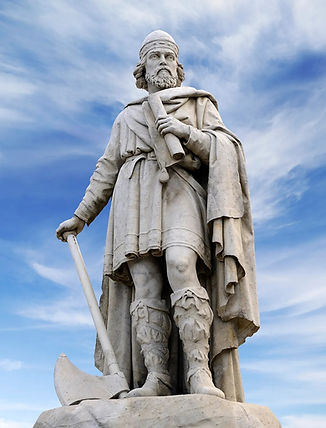
Alfred the Great - a Fortunate King?
with Max Keen

Max Keen was his usual exuberant and enthusiastic self when he spoke on the evening of Thursday 30 May. He made his appearance in the guise of a Saxon Thegn, complete with some ferocious weaponry which he described in detail.
Very few people over the centuries have merited the title “Great”, and England boasts just one – King Alfred. Max’s contention was that, great ruler that he was and founder of the English nation, much of his success was actually due to luck, hence the title of the talk. He was born in 849, in Wantage, the fourth son of King Ethelwulf and his wife Osburh. His three brothers all reigned before him, but died young. Alfred, in fact, was destined for a career in the church, and was sent to Rome at the age of 4 to begin his formal education. He also accompanied his father on a pilgrimage to the city a couple of years later and remained there for 2 years.
During his talk, Max traced the course of Alfred’s struggles with the Danes over a period of ten years, from 868, when he was fighting alongside his brother Ethelred in an unsuccessful attempt to keep the Great Host out of Mercia, to his defeat of the Danish army at the Battle of Edington in 878. (Brother Ethelred died in 871, and, two older brothers also having died young, Alfred became king). Along the way, Max demonstrated in what other sense Alfred could be deemed to have been lucky, namely in his battles. His most notable piece of good fortune occurred when reinforcements aiming to double the size of the Viking army at Exeter were drowned in a storm in Swanage Bay.
In January 878, the Danes made a surprise attack on Chippenham where Alfred had been spending Christmas, and he was forced to flee with a small band of companions to the island of Atheney in the Somerset levels, from where he organised the Anglo-Saxon resistance. (It was during this period that he was supposed to have burnt the “cakes” while sheltering in the home of a peasant woman.) 878 was a low point for the Saxon kingdoms, with only Wessex standing out against the Vikings. But from Athelney, Alfred rallied the people of south-west England, and in May 878, he won a decisive battle at Edington, near Westbury in Wiltshire. Having been starved into submission in their stronghold of Chippenham, the Danes made peace – their leader Guthrum converting to Christianity as part of the settlement – and withdrew to East Anglia into what was to become the Danelaw. It was Max’s contention that the Battle of Edington was one of the most decisive engagements in the history of the nation. Without Alfred’s victory, there would have been no England as we know it.
A period of comparative peace followed the treaty with Guthrum, although Alfred had to contend with sporadic Viking raids. It was during this time that he set up a new defence system based on the establishment of over 30 burhs – fortified settlements – about 19 miles apart so that in the case of an attack on any one settlement, military assistance could arrive within a day. And, in the 890s, he ordered the construction of a small fleet of ships – a move which earned him, from the Victorians, the title of the Father of the English Navy. He also devoted the final 10 years of his reign to the furtherance of education. An educated man himself, he translated a number of Latin works into the vernacular, and encouraged the education, at first in the court and then in the kingdom at large, of all free young men in their own tongue.
Alfred died in 899 at the age of about 50.
Concentrating in his talk on the military aspects of Alfred’s reign, Max, as ever, showed infectious enthusiasm for his subject. The audience was spellbound during the talk, and fascinated by the collection of weaponry that he had brought.